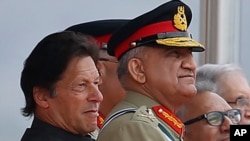Pakistan’s military chief Gen. Qamar Javed Bajwa traveled to Saudi Arabia on Monday for daylong official meetings amid reports of rare strains in historically close relations between the two key Muslim nations.
A brief Pakistani army statement said Bajwa met with Saudi Arabia's Gen. Fayyad bin Hamid Al-Ruwaili, chairman of the General Staff of the Armed Forces, and other top commanders to discuss military ties, including training exchanges. It did not give further details.
The visit comes days after Pakistan’s Foreign Minister Shah Mehmood Qureshi blasted the Saudi-led Organization of Islamic Cooperation (OIC) for not actively denouncing India’s actions in the disputed Kashmir region.
While Saudi officials have not commented on the current status of bilateral ties, Islamabad has downplayed reports of tensions and insisted Bajwa’s trip was pre-planned and part of ongoing military-to-military interactions between the two countries.
“There is no need to read too much into it. Thank God, everything is fine,” major general Babar Iftikhar, army spokesman, told reporters in the run-up to Bajwa’s visit to Riyadh.
Iftikhar noted that Pakistan and its people “are proud of their relations” with Saudi Arabia, and that there was no need to raise any question about them.
“These relations are historic, very important, excellent and will remain excellent. There should be no doubt of this. Nobody can doubt the centrality of the kingdom of Saudi Arabia to the Islamic world,” Iftikhar stressed.
The dispute over Kashmir has sparked two of the three wars between Pakistan and India, as both claim the Muslim-majority region in full.
The Pakistani government has repeatedly called for an emergency meeting of OIC foreign ministers to discuss recent deterioration in the human rights situation in the Indian-ruled portion of Kashmir. The organization has convened low-level meetings so far to discuss the situation instead.
Qureshi warned in an interview with a local news channel that if the OIC failed to meet Pakistan’s expectations, he would be “compelled to ask Prime Minister Imran Khan to call a meeting of the Islamic countries that are ready to stand with us on the issue of Kashmir and support the oppressed Kashmiris.”
A day later, the Pakistani Foreign Ministry strongly defended Qureshi’s statement, apparently dismissing suggestions that it was a mere emotional outburst.
"Pakistan and its people have more expectations from the OIC than from any other international organization because of our deep-rooted and fraternal ties with OIC member states and OIC itself,” the ministry noted.
Qureshi’s remarks triggered a series of media articles in domestic and foreign press claiming they have upset the Saudis and Riyadh was contemplating suspending economic support to Pakistan.
In February 2019, Saudi Crown Prince Mohammed bin Salman visited Pakistan and signed an emergency economic relief package worth $6.2 billion, including $3.2 billion worth oil credit facility, for Khan’s newly elected government to help tackle a balance-of-payments crisis
The United Arab Emirates, a staunch ally of Riyadh, also provided a similar relief package.
Saudi Arabia is one of the largest creditors and the biggest source of remittances into the cash-strapped South Asia nation from more than 2 million Pakistanis working there.
However, in the wake of recent diplomatic tensions, the Saudis have reportedly forced Islamabad to pay back $1 billion, though close ally China quickly acted and provided $1 billion to Pakistan to make up for the shortfall.
Riyadh has so far not commented on its reported actions or speculation that it plans to withdraw another $1 billion from the relief package and may not extend the oil credit facility.
Pakistan has maintained close defense ties with Saudi Arabia and has deployed around 2,000 troops to the kingdom to undertake security, as well as training missions there.
Pakistan’s former military chief Gen. Raheel Sharif is currently the head of a 41-nation Saudi-formed Islamic Military Alliance to fight terrorism.
“In fact, the level of Saudi-Pak defense cooperation is so deep and wide that the present conspiracy to jeopardize our time-tested ties seems to be fizzling out as quickly as it surfaced on the scene,” wrote former Saudi ambassador to Pakistan Ali Awadh Asseri in his opinion article published by the Arab News Monday.
Asseri noted the “historic partnership is too important to fail,” saying media reports of rifts in bilateral ties stemming from Qureshi’s remarks were “neither remotely connected nor are they factually correct.”






